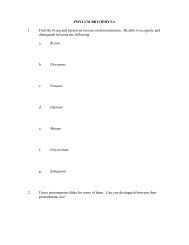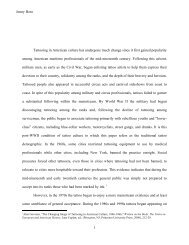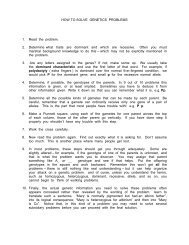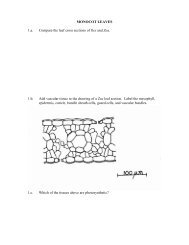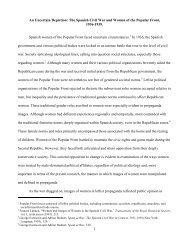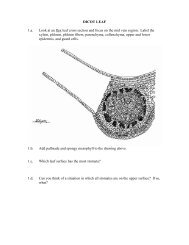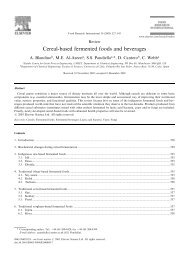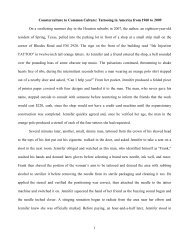Meat - Facing the Dilemmas
Meat - Facing the Dilemmas
Meat - Facing the Dilemmas
Create successful ePaper yourself
Turn your PDF publications into a flip-book with our unique Google optimized e-Paper software.
If meat is murder, what isvegetarianism?A letter from AmericaWORLDVIEWMarco Flavio Marinucci © Flaviophoto.comRaj PatelRaj Patel is <strong>the</strong> author ofStuffed and starved:markets, power and <strong>the</strong>hidden battle for <strong>the</strong> worldfood system(Portobello Books).With all <strong>the</strong> evidence that industrial meatproduction is bad for <strong>the</strong> environment,cannot be sustained equitably for <strong>the</strong> planet, is aprofligate waste of resources, accelerates globalwarming, and is a vector for all kinds of nastydisease, we might be tempted to enjoin everyone togo vegetarian. And <strong>the</strong>re’s much merit to <strong>the</strong> idea.Research shows that vegetarians and vegans havea smaller carbon footprint than <strong>the</strong>ir carnivorouscounterparts. In <strong>the</strong> United States, where about2.5 percent of <strong>the</strong> population is off meat, <strong>the</strong>re’sa marked difference between <strong>the</strong> annual CO2output of vegetarians and <strong>the</strong> average population.One recent study found that an ordinary US dietcontributed nearly 1.5 tons more CO2 than avegetarian one, and switching from meat-eating tovegetarian could cut US national greenhouse gasemissions by up to six percent.Vegetarians can also feel smug about <strong>the</strong>ir health. Arange of studies have shown that vegetarians have alower chance of dying from stroke and heart diseasethan <strong>the</strong> average population. One of <strong>the</strong> largeststudies of its kind was carried out in <strong>the</strong> UK, where33,883 meat-eaters were compared with 31,546non-meat-eaters. In that study, meat eaters weremore likely to smoke and to be more overweight.But, and this should give us pause, a range of studiesalso conclude that in o<strong>the</strong>r diseases, vegetariansand similarly health-conscious meat eaters fareequally well.It’s <strong>the</strong> ‘similarly health-conscious’ that oughtto set off alarm bells, because it suggests thatvegetarianism isn’t spread randomly throughsociety and that being vegetarian is associated witho<strong>the</strong>r kinds of health-increasing behaviour. This isborne out by <strong>the</strong> evidence.In <strong>the</strong> US, recent survey data find a link betweenoccupation and diet. Manual workers tend toeat more meat, and beef in particular, than <strong>the</strong>ircounterparts in service or professional occupations.Fur<strong>the</strong>r, eating less meat is linked to higher levelsof education though not, strikingly, with higherlevels of income, which suggests <strong>the</strong>re’s somethingcultural going on.This leads to an interesting twist to our thinkingabout meat and its absence. Certainly it’s true thatbecoming vegetarian can improve your life chances,o<strong>the</strong>r things being equal. But precisely becauseo<strong>the</strong>r things aren’t equal, <strong>the</strong> commandment to bevegetarian isn’t one that all of us can follow wi<strong>the</strong>qual ease. There is a host of social obstacles thatstand between <strong>the</strong> majority of <strong>the</strong> population in <strong>the</strong>Global North, and sustainable eating patterns.We already know, from studies in California forexample, that <strong>the</strong> amount of time you spendcommuting and your level of obesity are directlyrelated. We know that poor people are less ablethan <strong>the</strong> rich to live near <strong>the</strong>ir places of work.We know, fur<strong>the</strong>r, that 14 percent of US fastfood meals – dense in animal meat – are eaten incars. This comes not from a particular nationalfondness for <strong>the</strong> interior of cars as dining venuebut because, for many of America’s working poor,<strong>the</strong> only chance <strong>the</strong>y have to eat a meal is en routefrom one job to <strong>the</strong> next.Fur<strong>the</strong>r, it’s much harder to be vegetarian if youdon’t have access to fresh fruits and vegetables.If you live in a poor neighbourhood in <strong>the</strong> UnitedStates, you might be subject to ‘supermarketredlining’, a phenomenon named for its similarityto <strong>the</strong> banking practice of pinning red lines ontolocal maps to denote <strong>the</strong> areas where <strong>the</strong> bankwould make no loans. Supermarket redliningis like this, but with food. It is an increasingfeature of American geography that low incomeneighbourhoods are overwhelmingly less likelyto have fresh food markets, and far more likelyto have fast food outlets and convenience stores.The consolidation of supermarkets meansthat in Boston more than half of fifty big chainsupermarkets have closed since 1970, and <strong>the</strong>number in Los Angeles County has fallen byalmost 50 percent as <strong>the</strong> markets concentrate inonly <strong>the</strong> well-to-do areas.The choices that each of us make, <strong>the</strong>n, aren’t madefreely. And <strong>the</strong>re are some profound obstacles thatprevent society’s poorest from choosing a healthydiet. In <strong>the</strong> Global South, being vegetarian is a defacto state simply on <strong>the</strong> grounds of income. In<strong>the</strong> Global North, vegetarianism is <strong>the</strong> prerogativeof <strong>the</strong> middle class.So what changes, <strong>the</strong>n, would be required tomove all of us in <strong>the</strong> Global North towards a moresustainable diet? For a start, we ought to dispensewith <strong>the</strong> idea <strong>the</strong>re’s a magic bullet. No singleintervention can unpick <strong>the</strong> morass of culture andclass that pushes poorer people to unsustainableeating habits. In moving towards sustainableeating, it is important to jettison <strong>the</strong> kind ofthinking that reduces diet to individual choice.Instead, a range of policies are needed, fromencouraging fresh fruit and vegetable marketsin low income areas, to increased governmentsponsoredsocial housing nearer places of work,to building cities with walkable environmentsand green space, to living wage legislation, toa reduction in <strong>the</strong> length of <strong>the</strong> work day, andto some fairly serious investment in educationand healthcare to stamp out <strong>the</strong> injustices thataccompany our differential access to food.It is impossible, in short, to talk about meatin America or elsewhere without talking aboutclass. And, if we want to eat sustainably, that’s aconversation we can put off no longer.www.foodethicscouncil.org | Volume 2 Issue 4 | Winter 2007 19



